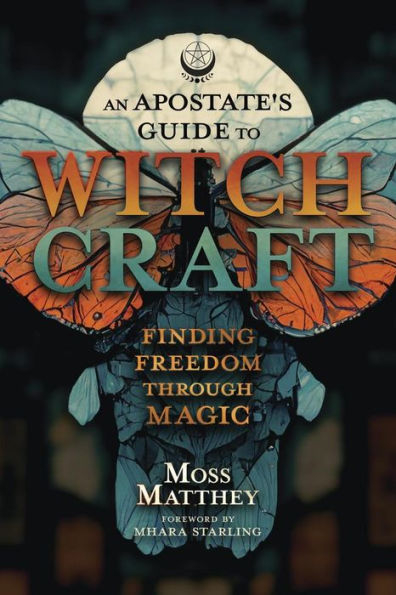This is author Moss Matthey’s heart-warming story of religious soul searching -- part memoir, part introduction to witchcraft, part practice guide, all parts woven together in a pleasant, page-turning read.
The title word, “apostate,” captures the spirit of Matthey’s quest. An apostate is someone who makes a formal break with a religious or political system, as opposed to just silently drifting off. To be an apostate takes courage, especially when someone was raised in an ideological system, or spent a great chunk of their life in it. Matthey writes in his introduction that he doesn’t mean his book to be “an attack on Christianity or a teardown of any doctrine.” He writes sincerely about his own experiences, having been, as he describes himself, an indoctrinated member of a “cult” for two decades.
From the publisher’s description, I thought this would be a book by and about someone who’d been in one of the small, freakish mind control groups that have populated the Christian evangelical subculture in recent decades. Those groups qualify easily as cults. But, no, Matthey was a member of the Jehovah’s Witnesses (JWs), a large, enduring proselytizing religious sect. His church was founded in the 19th century, and currently has about nine million members spread out over much of the world. I don’t doubt that the JWs hold a tightly controlled belief system and that they are punishing toward members who can’t or won’t conform. Calling them a cult is a semantic choice Matthey makes because he went through hell—pardon the expression. His experience with the JWs was intolerably harmful.
That’s because Matthey is gay. He gradually came out to himself and others as gay, and the JWs simply hate and will not tolerate queerness. To live his true life, Matthew became an apostate against Christian bigotry. Fortunately, he didn’t become one of the countless people who are scarred by a religion and then drift off with no spirituality to sustain them. Matthey found and is flourishing on a path of spiritual liberty and community.
This book is a conversion story that helps explain why so many people are drawn to witchcraft and paganism, terms Matthey says he uses interchangeably. What draws people to witchcraft is the fact that it’s decentralized, an idea he emphasizes throughout the book. Decentralized means “there is no doctrine at the core of what we believe. We’re not built around some sacred text or priesthood that tells us what to do or think. The practice and spirituality of ever single Witch is unique to them.”
And yet, witchcraft as Matthey explains it, does not leave one standing alone, isolated, trying to figure out, spiritually, what to do or how to be. Witchcraft, he writes, is “a treasure trove of practices, a wonderful and rich tradition... a beautiful collection of lore and beliefs, of stories and lessons passed down from our ancestors… the birthright of anyone who wishes to walk this path, for a spiritual yearning is a part of the human condition we all share.” Witchcraft is a place to be one’s unabashed self, alone and/or with others. For Matthey, spiritual home is with his partner Brett and a coven in the community of the Welsh bardic tradition. He’s close with Welsh witch Mhara Starling, author of the foreword to Matthey’s book and her own foundational book about Welsh witchcraft.
Woven in with Matthey’s personal storytelling, he offers a lot of helpful exercises, beginning with one on how to start and dedicate a spiritual journal. There are instructions for making protection jars, grounding on land, honoring ancestors. There’s a lovely, simple exercise for using a hot beverage of one’s choice in a ceramic mug to attune to the four elements. He’s got a chapter on how to extricate oneself from an abusive religion or cult, and then how to begin one’s own path of magical practices, wrapped throughout with the theme of individual choice and freedom.
Toward the end of the book, Matthey gently deconstructs some of the theology of Christian fundamentalism by way of explaining how witchcraft is not what Christian detractors have claimed it to be. In chapters on “Reclaiming the Devil” and “Contemplating the Divine,” he urges pagans to reclaim the witches’ Horned God from false associations with something “evil.” It was Christianity, as it conquered indigenous cultures over many centuries, that besmirched the pagan gods, created a bad thing called the “devil,” and then labeled anything outside the narrow bounds of Christian dogmas to be “Satanic.”
As a Jehovah’s Witness, Matthey was obliged to perform a kind of prayer that’s a “one-size fits all approach to divinity,” a “one-way communication” in which a supplicant asks God for everything and then stays “alert to notice the answer.” By contrast, pagan prayer is a dialogue with the Divine. In the “cult,” Matthey was taught that to doubt is the worst kind of sin, as blind faith was the name of the game. Yet, for witches, “the very concept of magic necessitates doubting that what we can immediately perceive is all there is to the world…..The job of the Witch is not to constantly doubt everything, nor is it to accept everything unquestioningly.” Holding in mind and heart things that seem to be contradictory is precisely the “middle ground” between the mundane and the magical, between physical and spiritual.
“To be a Witch,” Matthey writes, “is to be the perpetual seeker, in love with the mystery and all the doubt that comes with it.”
An Apostate’s Guide is a beautiful rendition of how one fellow soul has made the crooked path his own.
~review by Sara R. Diamond
Author: Moss Matthey
Llewellyn Publications, 2024
221 pages, $18.99

